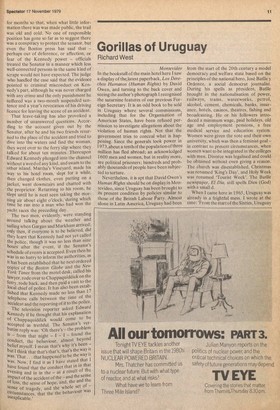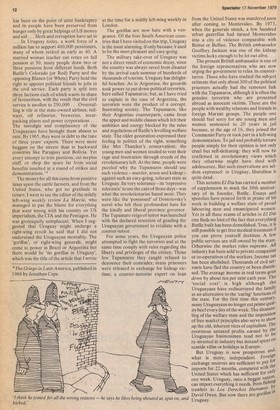Gorillas of Uruguay
Richard West
Montevideo In the bookstall of the main hotel here I saw a display of the.latest paperback, Los Derechos Humanos (Human Rights) by David Owen, and turning to the back cover and seeing the author's photograph I recognised the saturnine features of our previous Foreign Secretary. It is an odd book to be sold in Uruguay where several commissions, including that for the Organisation of American States, have been refused permission to investigate allegations about the violation of human rights. Not that the government tries to conceal what is happening. Since the generals took power in I 973,about a ten th of the population of three million has fled abroad; an acknowledged 1600 men and women, but in reality more, are political prisoners; hundreds and probably thousands of people have been subjected to torture.
Nevertheless, it is apt that David Owen's Human Rights should be on display in Montevideo, since Uruguay has been brought to its present condition by policies similar to those of the British Labour Party. Almost alone in Latin America, Uruguay had been from the start of the 20th century a model democracy and welfare state based on the principles of the national hero, Jose Batlle y Ordonez, a social democrat journalist. During his spells as president, Bailie brought in the nationalisation of power, railways, trams, waterworks, petrol, alcohol, cement, chemicals, banks, insurance, hotels, casinos, theatres, fishing and broadcasting. He or his followers introduced a minimum wage, paid holidays, old age and employment pensions, a free medical service and education system. Women were given the vote and their own university, which was then a feminist goal — in contrast to present circumstances, when women want to be integrated in the colleges with men. Divorce was legalised and could be obtained without even giving a reason. The church was disestablished, Christmas was renamed 'King's Day', and Holy Week was renamed 'Tourist Week'. The Batik newspaper, El Dia, still spells Dios (God) with a small d.
When I came here in 1965, Uruguay was already in a frightful mess. I wrote at the time: 'From the start of the Sixties, Uruguay has been on the point of utter bankruptcy and its people have been preserved from hunger only by great helpings of US money and aid .. . Sloth and corruption have set in . In Uruguay today, a work force of a million has to support 400,000 pensioners, many of whom retired as early as 40. A married woman teacher can retire on full pension at 30, many people draw two or three pensions from different funds. Both Batlle's Colorado (or Red) Party and the opposing Blanco (or White) Party hold the right to appoint political friends to jobs in the civil service. Each party is split into three factions each of which wants its share of favouritism, with the result that the civil service is swollen to 250,000 . . . Overstaffing is rife in the state-owned airlines, railways, oil refineries, breweries, meatpacking plants and power corporations . . . The nostalgia and complacency of the Uruguayans have brought them almost to ruin. By 1965, they were in debt to the tune of three years' exports. There were more beggars' on the streets than in backward countries like Paraguay and Bolivia. Yet every attempt to trim pensions, cut surplus staff, or chop the spare fat from social benefits resulted in a round of strikes and demonstrations.' * • The money for all this came from punitive taxes upon the cattle farmers, and from the United States, who got no gratitude in return. I went to see the editor of the mildly left-wing weekly review La Marcia, who managed to put the blame for everything that went wrong with his country on US imperialism, the CIA and the Pentagon. He was grotesquely complacent. When I suggested that Uruguay might undergo a right-wing revolt he said that I did not understand the Uruguayan mentality. The 'gorillas', or right-wing generals, might come to power in Brazil or Argentina but there would be 'no gorillas in Uruguay', which was the title of the article that I wrote at the time for a mildly left-wing weekly in London.
The gorillas are now here with a vengeance. Of the four South American countries that I have visited on this trip, Uruguay is the most alarming, if only because it used to be the most pleasant and easy-going.
The military take-over of Uruguay was not a direct result of economic decay, since the country was always saved from disaster by the arrival each summer of hundreds of thousands of tourists. Uruguay has delightful beaches. As in Argentina, the generals took power to put down political terrorists, here called Tupamaros; but, as I have tried to explain in the case of Argentina, the terrorists were the product of a corrupt, frustrating society. The Tupamaros, like their Argentine counterparts, came from the upper and middle classes which felt their ambition and energy blocked by the rules and regulations of Badle's levelling welfare state. The older generation expressed their feeling in politics of the right, something like Mrs Thatcher's conservatism; the young men and women tended to vent their rage and frustration through creeds of the revolutionary left. At the time, people were puzzled why the Tupamaros should use such violence – murder, arson and kidnap – against such an easy-going, tolerant state as Uruguay. Its very tolerance – its 'repressive tolerance' to use the cant of those days –was what the revolutionaries hated most. They were like the 'possessed' of Dostoievsky's novel who felt their profoundest hate for the kindly and liberal province governor. The Tupamaro reign of terror was launched with the declared intention of goading the Uruguayan government to retaliate with a counter-terror.
For some years, the Uruguayan police attempted to fight the terrorists and at the same time comply with rules regarding the liberty and privileges of the citizen. Those few Tupamaros they caught refused to denounce their comrades; many prisoners were released in exchange for kidnap victims; a counter-terrorist expert on, loan from the United States was murdered soon after coming to Montevideo. By 1973, when the generals struck, a few hundred urban guerrillas had turned Montevideo into a city of violence comparable with Beirut or Belfast. The British ambassador Geoffrey Jackson was one of the kidnap victims lucky enough to be let out alive.
The present British ambassador is one of the foreign representatives who are now urging the government to relax its counterterror. Those who have studied the subject estimate that only about 300 of the political prisoners actually had the remotest link with the Tupamaros, although it is often the genuine terrorists who are presented abroad as innocent victims. These are the people with wealthy relations and friends in foreign Marxist groups. The people one should feel sorry for are young men and women sentenced to 20 years in jail because, at the age of 16, they joined the Communist Party or took part in a left-wing demonstration. To jail and probably torture people simply for their opinion is not only cruel but self-defeating: they will now be confirmed in revolutionary views which they otherwise might have shed with adolescence. But such reservations are seldom expressed: in Uruguay, liberalism is quite dead.
This autumn El Dia has carried a number of supplements to mark the 50th anniversary of its founder, Bathe. Essays and speeches have poured forth in praise of his work in building a welfare state of proud labouring men and emancipated women, Yet in all these reams of articles in El Dia one finds no hint of the fact that everything Bathe built has been demolished. True, it is still possible to get free medical treatment if you can prove yourself destitute A few public services are still owned by the state. Otherwise the market rules supreme. All industry has been sold to private companies or co-operatives of the workers. Income tax has been abolished. Thousands of civil servants have fled the country or been dismis sed. The average income in real terms goes down by about ten per cent each year. The 'social cost' is high although the Uruguayans have rediscovered the familY as an alternative to the 'caring' functions of the state. For the first time this century, many Uruguayans no longer eat prime qual ity beef every day of the week. The dismant ling of the welfare state and the imposition of free market principles also serve to show up the old, inherent vices of capitalism. The enormous untaxed profits earned by the Uruguayan businessmen tend not to be re-invested in industry but instead spent orl seaside villas or holidays in Europe. But Uruguay is now prosperous a. d n, what is more, independent. Foreign exchange reserves are sufficient to pay f(-)/ imports for 22 months, compared with the United States which has sufficient for onlY one week. Uruguay, once a beggar nation, can import everything it needs, from fishlang trawlers to Los Derechos Humanos D.Y David Owen. But now there are gorillas in Uruguay.







































 Previous page
Previous page